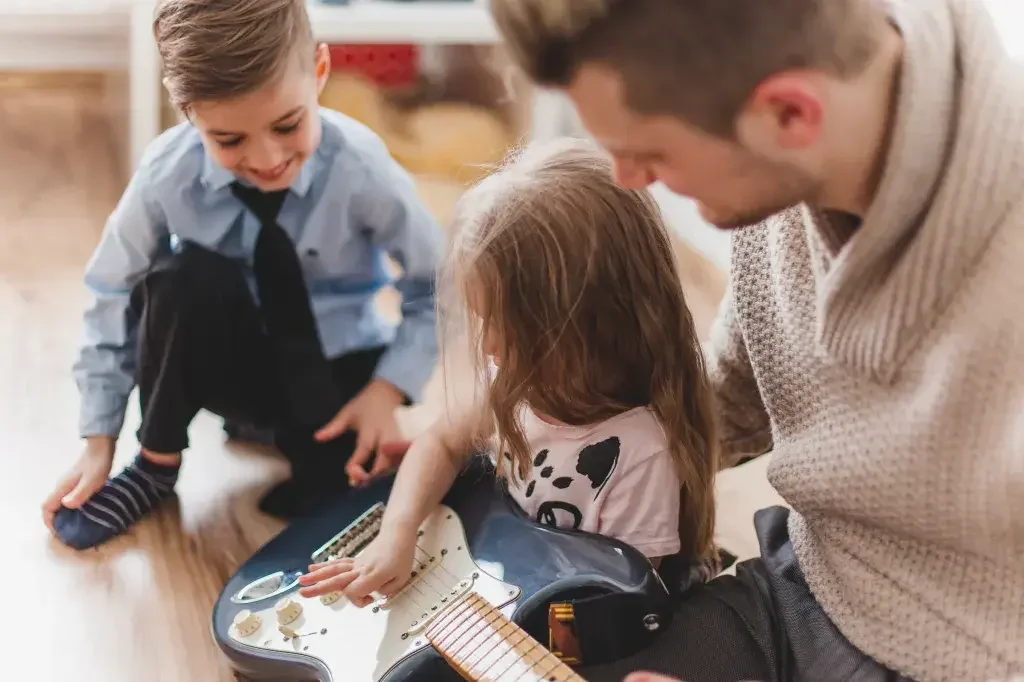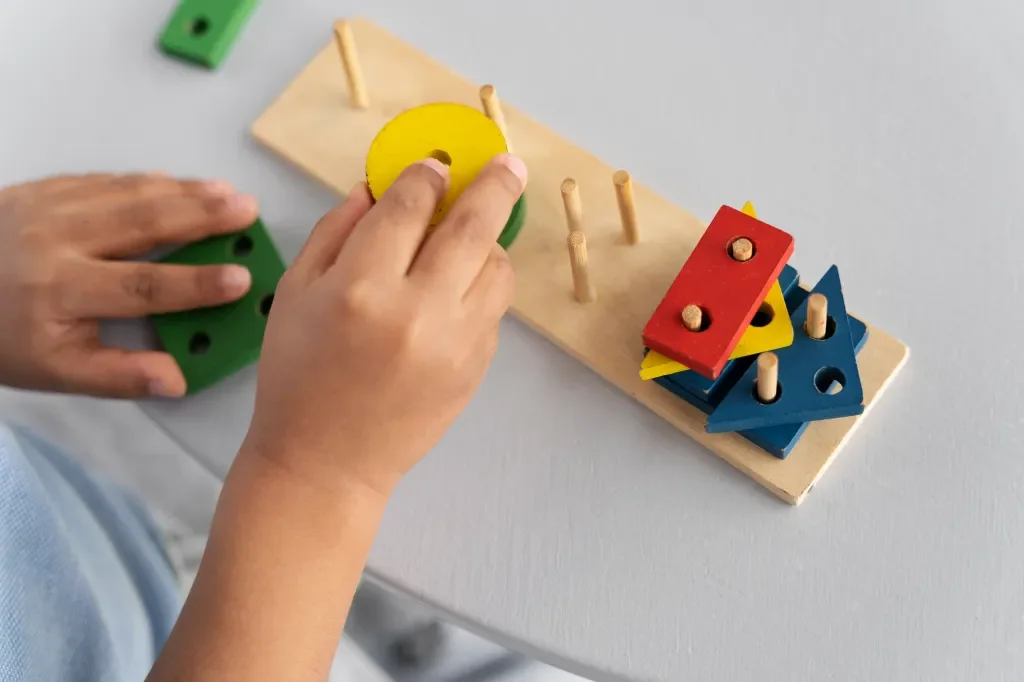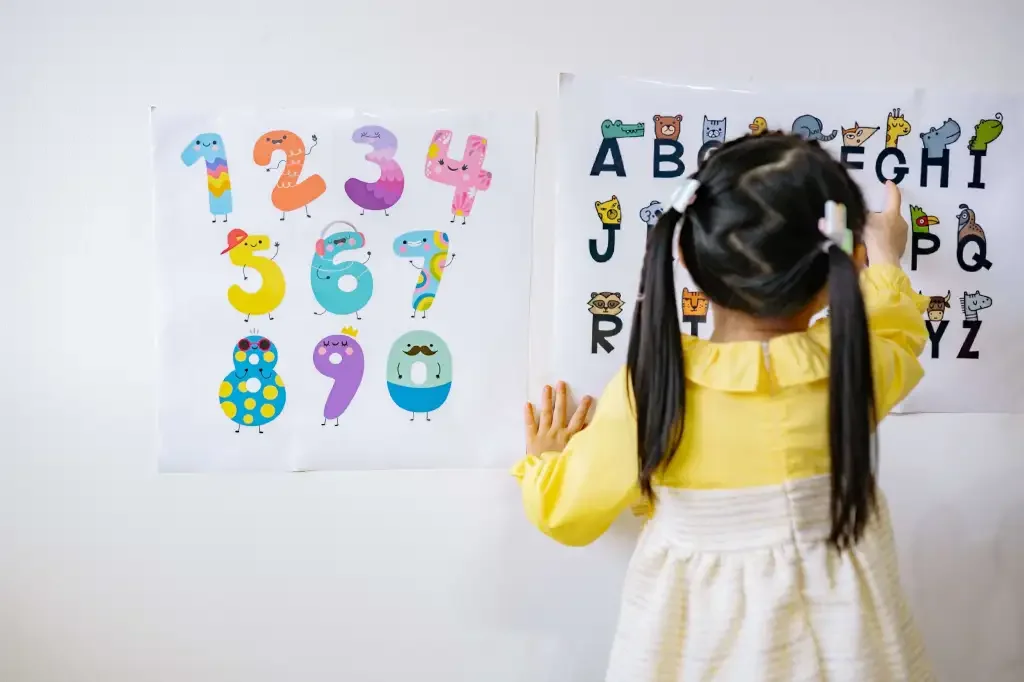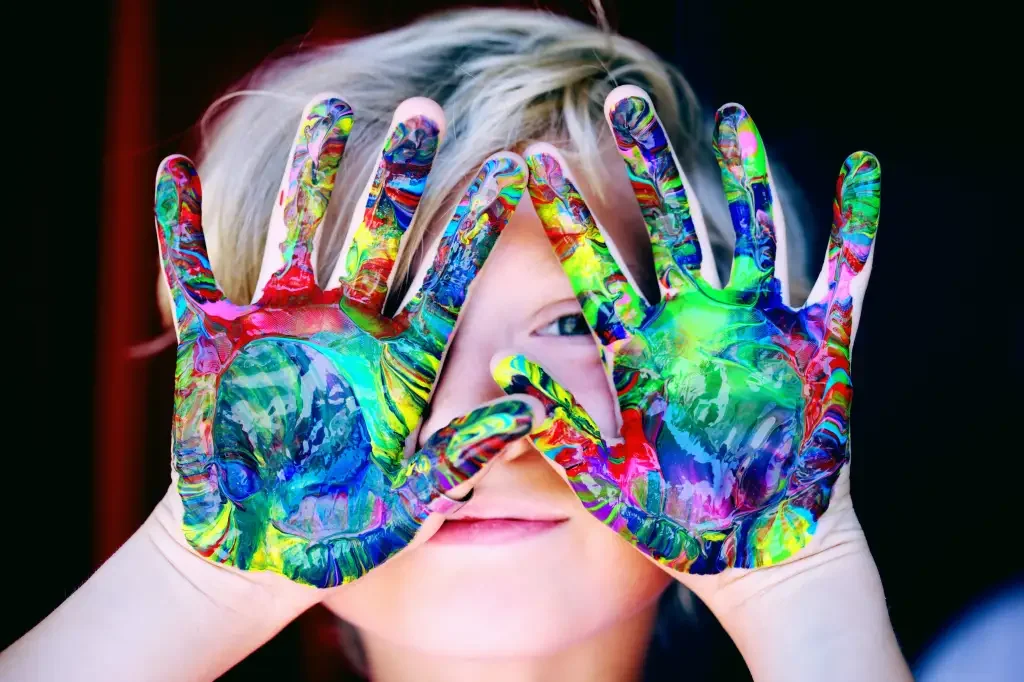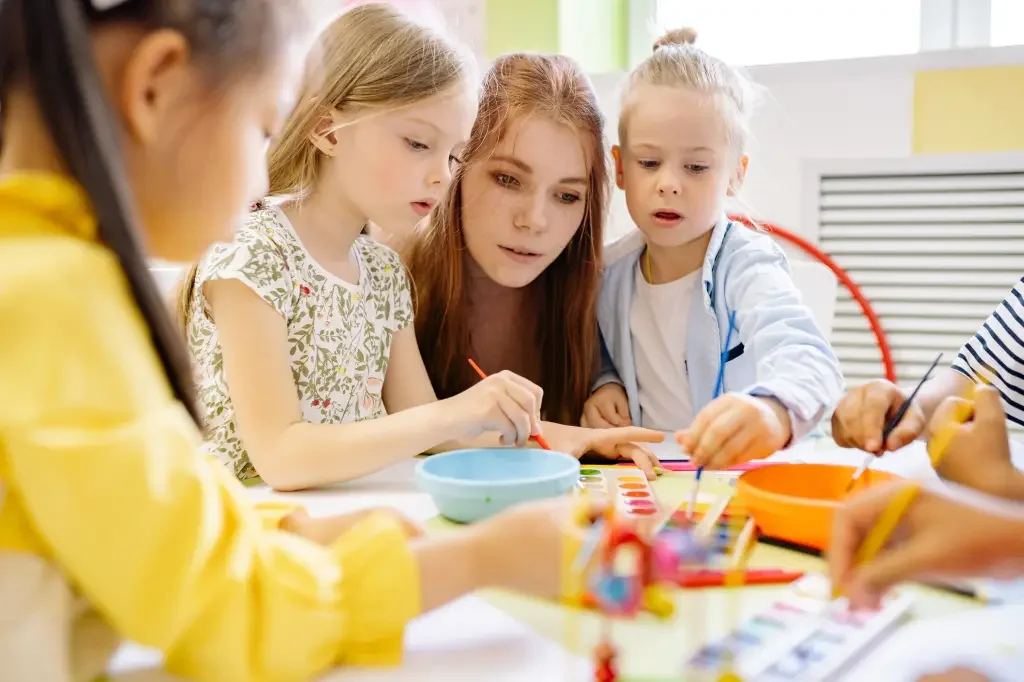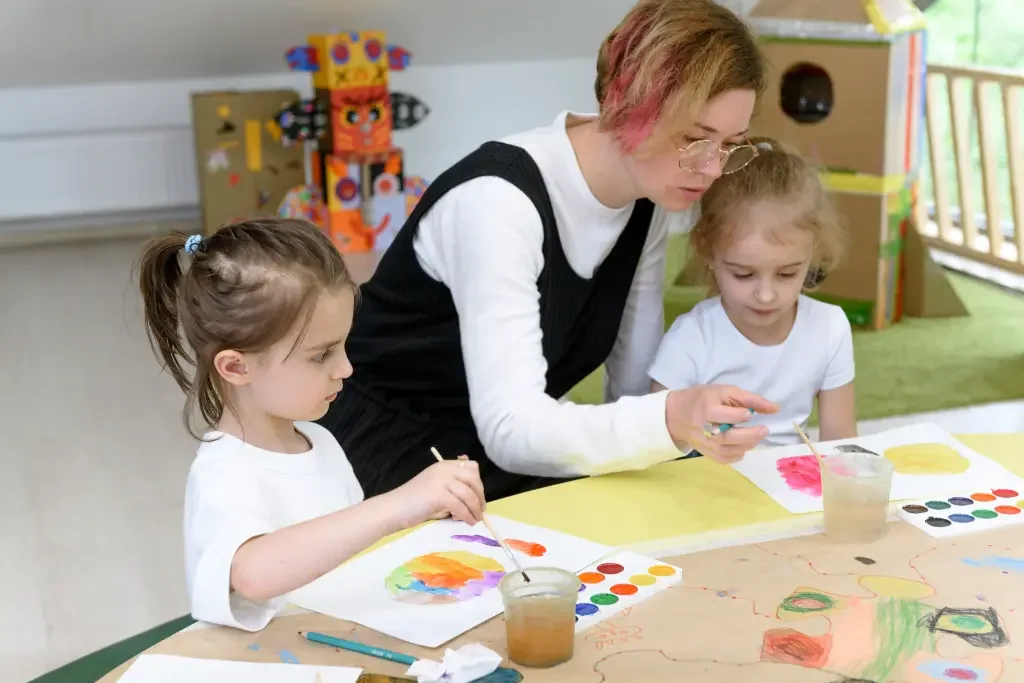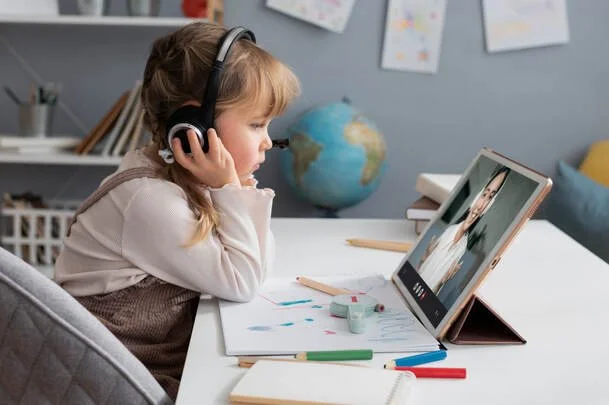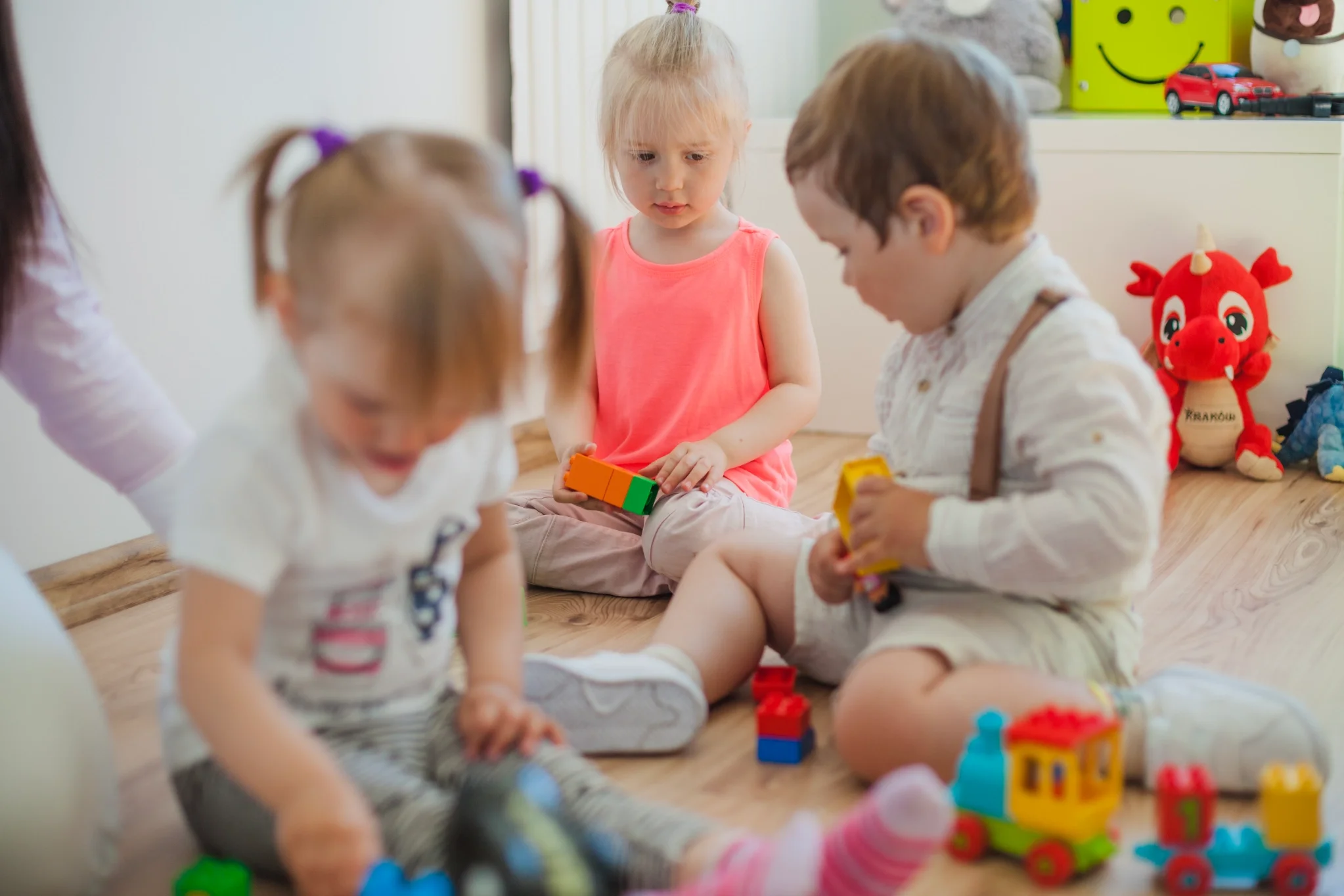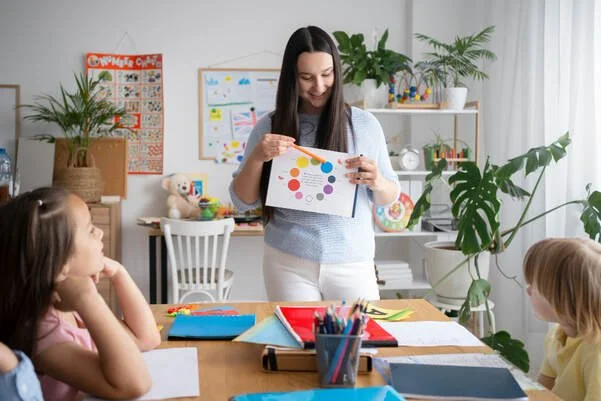7 Reasons Parents Prefer Montessori Daycare and Preschool
Families often choose a Montessori preschool because it gives children the freedom to explore, solve problems, and build confidence in a calm, organized space. Montessori childcare settings offer thoughtful routines and materials that help toddlers and preschoolers grow at their own pace. Here are 7 of the most important reasons for choosing a Montessori education.
1. Children Build Independence Through Daily Tasks
Montessori environments introduce simple routines that help children care for themselves and their surroundings. Tasks like putting work away or preparing snack items build confidence and create smoother transitions at home.
2. Emotional Development Is Supported Through Respectful Guidance
Teachers use warm, responsive interactions to help children identify feelings and practice self-regulation. The American Academy of Pediatrics highlights howearly caregiver responses support emotional and behavioral development.
3. Hands-On Learning Strengthens Cognitive Skills
Preschoolers use materials designed to help them sort, compare, and explore patterns. These activities reinforce early math and language concepts. Children gain focus through repetition, which strengthens concentration and reasoning.
4. Montessori Daycare Encourages Purposeful Movement
Classrooms allow children to move freely between activities. This supports motor coordination and physical confidence. Research shows that early learning environments with structured movement help children build stronger physical and cognitive foundations. For Montessori, a prepared environment is at the root of the learning process.
5. Practical Life Activities Prepare Children for Real Tasks
Pouring water, sweeping small messes, and matching objects teach coordination and responsibility. These activities introduce early problem-solving while encouraging children to take pride in meaningful work. Additionally, practical life skills are ideal for practice at home, providing a connection between school and family life.
These activities also support:
Fine motor control
Order and sequencing
Confidence through repetition
6. Montessori Preschool Strengthens Social Skills
Mixed-age groups help children practice patience, empathy, and cooperation. Younger students learn from older peers, while older children gain leadership experience in a natural way. Calm, predictable routines help children navigate social moments with confidence.
7. Families Appreciate Predictable, Child-Centered Routines
Across the Bay Area, parents notice how consistent schedules and thoughtful classroom design reduce frustration and support smoother daily rhythms. A recent review of early childhood programs shows that predictable routines help children build emotional security and readiness for learning. These habits give preschoolers the structure they need to explore confidently.
Key Takeaways
Before looking at the core points, it helps to see how these ideas work together in a Montessori setting. The takeaways below highlight the routines, materials, and teacher interactions that shape a child’s daily experience. They also show how Montessori preschool supports steady growth across emotional, social, and cognitive skills. Parents often prefer Montessori daycare and preschool because it offers:
Calm environments that support independence
Hands-on materials that build focus and problem-solving
Respectful teacher guidance rooted in emotional development
Montessori preschool is a learning adventure for children. Because the Montessori Method puts emphasis on tasks that children can choose and use on their own, kids have fun without realizing the educational value of the activities they use.
How Montessori Preschool Builds Problem-Solving Skills
A Montessori preschool environment encourages children to observe, explore, and work through challenges at their own pace. These early experiences help young learners develop steady confidence as they experiment with ideas, refine motor skills, and collaborate with peers. Families often notice how quickly children become curious thinkers once they begin exploring practical materials.
The Problem: Young Learners Need Guided Opportunities to Think Independently
Preschoolers naturally ask questions as they encounter new situations. However, many early learning environments offer limited chances to practice open-ended problem-solving. When children are directed too quickly, they miss opportunities to strengthen reasoning, persistence, and creative decision-making. Research from Harvard’s Center on the Developing Child explains that early serve-and-return interactions shape the brain systems involved in memory and flexible thinking.
The Montessori Solution: Hands-On Exploration With Purposeful Materials
Montessori classrooms invite children to solve problems through experimentation. Practical life trays, sensorial materials, and early math tools are designed to present a challenge, then guide children toward self-correction. This approach supports independence while reinforcing attention and emotional regulation. A closer look at Montessori’s practical life activities shows how meaningful tasks build essential cognitive habits.
Children strengthen problem-solving through tasks like:
Matching shapes and refining categories
Sequencing objects by size or color
Choosing tools that support early writing or counting
These choices help preschoolers observe patterns and explore solutions in a calm, predictable space.
How Montessori Preschool Builds Reasoning Step by Step
Montessori environments provide structured challenges that grow with each learner. The following sequence shows how children practice problem-solving daily:
They choose a material that interests them.
They explore the task by observing, touching, and testing steps.
They identify what works and adjust when something does not work.
They repeat the task to confirm their understanding.
This process strengthens memory, persistence, and coordination. The CDC notes that preschool-age children develop stronger planning and reasoning between ages four and five, especially when encouraged to explore independently.
Local Context: How Montessori West Supports Preschool Thinking Skills
Across the Bay Area, families appreciate how Montessori West classrooms provide calm spaces where children can solve problems without pressure. Teachers guide with questions that help children think through possibilities and reflect on their choices. These habits build confidence that carries into early reading, math, and social experiences. The structured yet flexible environment allows preschoolers to master practical skills, manage emotions, and collaborate with peers.
Key Takeaways
Montessori classrooms are designed to assist children in learning. Through self-correcting activities, they become familiar with the process of critical thinking. Problem-solving develops naturally when preschoolers experience:
Hands-on task exploration
Predictable routines that support focus
Thoughtful teacher guidance
Opportunities for independent decision-making
Montessori preschool encourages children to move through challenges with curiosity and purpose. With individual guidance, a prepared environment, and self-guided activities, children learn to think about their actions and build critical thinking skills that help them learn and grow.
How Montessori Math Materials Build True Number Sense
Math doesn’t have to feel intimidating to young children. In a Montessori preschool environment, numbers become tangible through hands-on exploration. Instead of memorizing symbols or repeating formulas, students use beads, rods, and counters to see and feel mathematical relationships. This direct experience builds confidence and understanding far earlier than rote instruction ever could.
The Power of Concrete Learning
When children manipulate golden beads to represent units, tens, hundreds, and thousands, abstract numbers suddenly gain meaning. They can see what “ten times ten” looks like, touch it, and arrange it on a mat. This sensory process activates both motor and reasoning centers in the brain, creating durable connections between quantity and symbol.
In a Montessori preschool program, math is a language to explore. Students match numerals to bead quantities, sequence patterns, and eventually record results independently. Each step connects to the next in a logical progression that reinforces accuracy through discovery.
A Developmental Path Toward Abstraction
Traditional math lessons often skip directly to symbols, leaving many students unsure of what those numbers truly represent. Montessori classrooms take the opposite approach. By first internalizing patterns through movement and repetition, children develop an intuitive grasp of numerical relationships. They are not told that four plus four equals eight—they see it and build it with their own hands.
This developmental sequence leads naturally toward abstraction. Once a child has mastered concrete tools like number rods and bead chains, they can easily visualize numbers in their mind. That ability, known as “mental representation,” is what researchers call true number sense.
Recent research in Education and Culture shows that when manipulatives are used intentionally, children move from concrete exploration to abstract understanding. The study finds that math toolkits which enable children to physically engage with numbers support stronger reasoning and connection-making.
Encouraging Precision and Confidence
Montessori math materials also teach precision through control of error. If a quantity doesn’t match its numeral, the child sees and corrects it without teacher intervention. This independence strengthens problem-solving skills and builds genuine confidence. Teachers serve as quiet guides, ensuring each child progresses at their own pace without pressure or competition.
Because math materials are self-correcting, frustration remains low while concentration grows. The rhythm of hands-on learning creates an internal sense of order that helps children apply logic to new challenges both inside and outside the classroom.
For a deeper look at how Montessori teachers guide learning rather than direct it, explore
Building a Lifelong Relationship with Numbers
The ultimate goal of Montessori math is not memorization but mastery through understanding. When concepts are introduced through touch, movement, and repetition, children begin to think mathematically in daily life—counting steps, sorting toys, or recognizing geometric forms in their environment.
At schools like Montessori West, parents often notice their children’s fascination with patterns and problem-solving grows naturally at home. The same joy that fuels early math learning becomes a foundation for curiosity in science, engineering, and art.
Montessori math materials transform numbers from abstract ideas into meaningful tools for exploration. By trusting children to build understanding through experience, Montessori education cultivates both accuracy and wonder, proving that when math begins with the hands, it endures in the heart.
The Science Behind Montessori and How It Works for Every Child
What makes Montessori education so effective for children of every temperament and learning style? Scientific research increasingly supports what Dr. Maria Montessori observed more than a century ago: children learn best when they move freely, make choices, and explore real materials in a structured environment. In a Montessori preschool classroom, every material and activity is designed to connect curiosity with focus. This fusion of independence and intention is what distinguishes Montessori from traditional instruction and what continues to fascinate psychologists today.
Discovery Builds the Brain
Recent neuroscience reveals that learning through movement and choice strengthens the same brain regions responsible for self-control and problem-solving. Each activity in a Montessori preschool program isolates a single concept such as weight, texture, quantity, color, or sound, so the brain can study relationships deeply instead of memorizing surface details. When a child repeats an action until mastery, neural pathways are reinforced through myelination, the process that turns trial into skill.
This hands-on repetition also improves executive functioning. Children who pour, sort, and count develop precision and patience before they even realize they are practicing math and coordination. The quiet order of the classroom supports focus in ways lectures cannot. What seems simple—transferring beans with a spoon or matching shapes by feel—is actually building the foundation for abstract reasoning and problem-solving later in life.
Teachers as Guides, Not Directors
Montessori educators prepare the learning environment. Their role is to observe and respond, stepping in only when a student truly needs redirection. This model of “freedom within limits” nurtures independence and self-correction, two qualities linked by research to stronger academic resilience. When children recognize that errors are part of learning, anxiety decreases and curiosity increases.
Classrooms function as mini-communities where respect and responsibility grow naturally. Students learn to wait their turn for materials, tidy their workspace, and assist peers. These moments of cooperation are powerful social lessons that extend beyond the classroom walls.
A Prepared Environment That Teaches Itself
Every detail of a Montessori classroom is intentional, from the natural lighting and open shelving to the child-sized furniture that encourages autonomy. Psychologists call this a “responsive environment,” one that adapts to developmental readiness. When a child chooses to pour water, polish brass, or trace sandpaper letters, the activity stimulates the senses and builds neural networks that connect motion with memory.
A 2022 longitudinal study in Frontiers in Psychology found that Montessori students outperformed peers in language, math, and social-emotional regulation. Researchers concluded that the method’s self-paced structure and extended work cycles reduce cognitive overload while promoting calm focus. In other words, the Montessori classroom itself operates like a scientific experiment in learning efficiency, constantly refined by observation and response.
Nurturing the Whole Child
Montessori education treats intellect, emotion, and character as inseparable. Grace and courtesy lessons teach empathy, cooperation, and kindness, values that thrive in the absence of competition. Families who join an educational organization like Montessori West often notice a positive transformation: children become more confident, patient, and capable of sustained concentration at home as well as at school.
By trusting children to make meaningful choices, Montessori empowers them to see learning as a joyful, lifelong process. The evidence behind it is clear, but the real proof appears every day in the calm confidence of students who know how to learn, lead, and care for others.
5 Practical Life Skills Every Montessori Preschooler Masters
Practical life lessons are the heart of Montessori preschool programs. These exercises give children confidence and self-direction long before academic lessons begin. Tasks that adults might consider routine become meaningful challenges for young learners. They help children strengthen coordination, patience, and responsibility through everyday activities that translate naturally into independence at home and school.
One reason these activities matter so much is that they satisfy a child’s natural desire to contribute. When children pour water, button a sweater, or sweep the floor, they see immediate results. The process is joyful because it gives them real control over their environment. The Montessori classroom is carefully designed to encourage this sense of purpose while providing just the right amount of challenge.
Pouring and Transferring
Children begin with large materials such as beans or rice before progressing to liquids. They learn to control movement, correct spills calmly, and repeat until they achieve balance. This simple sequence develops concentration and hand-eye coordination, skills that support writing and self-feeding later on.
Dressing Frames and Self-Care
Fastening buttons, zipping jackets, and tying shoelaces are milestones in a young child’s growth. Montessori preschool dressing frames allow repeated practice in a calm setting. Each repetition builds independence and fine-motor strength. The result is pride in being able to care for oneself, which is a foundation for lifelong self-reliance.
Cleaning and Care of the Environment
Children take turns dusting shelves, watering plants, and sweeping floors. These routines teach respect for shared spaces and an understanding of community responsibility. The environment stays beautiful because everyone contributes. Teachers model each task patiently until it becomes second nature.
Grace and Courtesy
Courtesy lessons show children how to greet others, wait their turn, and listen politely. These moments nurture empathy and respect. In a Montessori preschool, social skills are treated with the same importance as math or reading readiness. A child who can communicate kindly is prepared to succeed in any learning environment.
Food Preparation and Table Service
Children slice bananas, spread butter, and pour juice using child-sized tools. They learn to set tables, serve friends, and clean up afterward. These experiences connect practical action with social warmth, transforming mealtime into a moment of cooperation and gratitude.
Broader Developmental Benefits of Montessori Activities
Beyond individual tasks, common Montessori activities nurture growth across multiple developmental areas. Each carefully chosen exercise stimulates mental focus, emotional balance, and problem-solving ability. As children gain competence through repetition and responsibility, they build lifelong habits that support cognitive and social well-being.
Cognitive Growth: Sorting, pouring, and sequencing tasks strengthen concentration, memory, and logic.
Emotional Regulation: Predictable routines and calm repetition build patience and self-control.
Social Development: Partner work, turn-taking, and shared materials encourage cooperation and empathy.
Physical Coordination: Fine and gross motor exercises enhance strength, control, and endurance.
Together, these five skills and broader developmental benefits illustrate the heart of Montessori education. Practical life work is more than classroom housekeeping; it is purposeful learning that builds independence, concentration, and respect. Each mastered skill represents a step toward confident participation in daily life. Through the structure of a Montessori toddler program, children discover that they are capable, valued, and ready to explore a larger world.
What Parents Should Know About Montessori Kindergarten Readiness
Kindergarten readiness looks different in a Montessori preschool than it does in a conventional classroom. The focus centers on independence, concentration, coordination, and social grace. These capacities grow through daily work with real materials, gentle routines, and respectful guidance. When parents understand the signs to watch for, they can support development at home and feel confident about timing the move into the next learning stage.
What Readiness Means in Montessori
Readiness is the child’s ability to manage practical tasks, sustain attention, and participate constructively in a community. A ready child chooses work, completes cycles, and cares for materials without constant reminders. The child communicates needs with patience and responds to simple multi-step directions. These markers suggest a growing sense of order and responsibility, which helps the first year of kindergarten feel calm and successful.
Readiness Indicators You Can Observe at Home
Consistent patterns will indicate that preschool children are ready to advance. Notice whether your child dresses with minimal help, tidies play spaces, and returns items to their places. Watch for longer stretches of focused play and a willingness to try again after small mistakes. Observe turn-taking with siblings or friends, kind greetings, and problem-solving with words. These habits mirror classroom expectations and reduce first-week stress.
How Montessori Preschool Builds These Capacities
The Montessori preschool environment offers long, uninterrupted work periods that train attention. Practical life exercises strengthen coordination and self-care. Sensorial materials refine perception and prepare the mind for language and math. Grace and courtesy lessons model greetings, apologies, and conflict resolution. Step by step, children learn to plan, act, reflect, and adjust. This cycle of autonomy and feedback forms a durable foundation for kindergarten.
Common Misunderstandings, Clarified
“Readiness is academic drill.” In Montessori, readiness begins with independence, concentration, and social ease.
“Kindergarten requires strict adult control.” Montessori demonstrates that clear routines and self-management lead to calm cooperation.
“Children should accelerate content quickly.” Depth and mastery matter more than speed, which protects confidence and curiosity.
Partnering With Guides and Families
Readiness grows fastest when school and home speak the same language. Parents who provide predictable routines, child-sized tools, and time for unhurried practice see steady progress. Guides can share observations from the classroom, such as how a child chooses work or resolves conflicts. Families can echo those skills at home with simple responsibilities and warm feedback that highlights effort and improvement.
Timeline and Next Steps
Every Montessori child’s path unfolds at a natural pace. Families can review growth over several weeks, noting consistent gains in attention, self-care, and social skills. Short visits to the kindergarten environment, quiet observation, and conversation with the guide provide valuable insight. With a clear picture of strengths and needs, the transition plan feels supportive and calm for the child and reassuring for the family.
Kindergarten readiness in a Montessori preschool is the sum of many small victories. Children who manage themselves, focus with purpose, and care for their environment arrive prepared to learn with joy. When home and school nurture these habits together, the first year becomes a season of growth marked by curiosity, steady effort, and genuine pride in meaningful work.
Important Questions that Informed Parents Ask About Montessori Preschool
Choosing a preschool is one of the biggest decisions parents make for their child’s early years. Families who explore Montessori often want to know more about how this unique approach works and what it means for their child’s development. Here are some of the most common and thoughtful questions parents ask when considering a Montessori preschool.
How Does Montessori Differ from Traditional Preschool?
Parents often want to understand what makes Montessori distinct. The key difference is that Montessori classrooms are designed around self-directed learning rather than teacher-led instruction. Children choose activities from a prepared environment, and teachers guide rather than dictate. This approach helps foster independence, confidence, and intrinsic motivation, which are not always emphasized in traditional preschool models.
What Role Do Teachers Play?
Another frequent question is about the role of the teacher. In Montessori, teachers act as guides and observers. They introduce materials when a child is ready and step back to allow exploration and discovery. Parents value knowing that teachers are there to support growth without pressuring children, creating a balance between freedom and structure.
Are Children Really Learning Academic Skills?
Many parents ask how Montessori addresses reading, writing, and math. Montessori materials are designed to introduce these skills in a hands-on way that feels natural to children. Sandpaper letters, movable alphabets, number rods, and golden beads make abstract ideas concrete. Parents are reassured when they see how these tools build strong academic foundations while keeping learning joyful.
How Does Montessori Handle Social Development?
Families often wonder if independence means less social interaction. In reality, Montessori classrooms are built around community. Children practice grace and courtesy lessons, work together on activities, and learn conflict resolution skills. Parents see that their child is not only building friendships but also learning empathy, cooperation, and respect for others.
What Is the Daily Routine Like?
Consistency is important for toddlers and preschoolers, so parents frequently ask about the classroom schedule. Montessori classrooms typically follow a predictable rhythm that includes uninterrupted work periods, group activities, and outdoor time. This routine provides security while also allowing flexibility for individual learning paths.
Will Montessori Prepare My Child for Kindergarten and Beyond?
One of the most important concerns parents raise is readiness for future schooling. Montessori does more than prepare children academically. It develops problem-solving, focus, and adaptability. Parents recognize that these qualities help their child transition smoothly into kindergarten and continue to thrive in new environments.
By asking these questions, informed parents gain a deeper understanding of how Montessori preschool supports the whole child. They discover that this approach is not only about early academics but also about fostering independence, respect, and a lifelong love of learning.
5 Proven Montessori Preschool Activities That Inspire Love for Learning
Montessori preschool classrooms are designed to spark curiosity and help children discover the joy of learning. Instead of relying on memorization, they use purposeful, hands-on activities that encourage exploration and independence. These proven activities not only build academic skills but also instill a deep love for learning that lasts far beyond the preschool years.
1. Practical Life Activities
Everyday tasks like pouring, sweeping, or buttoning are more than chores in a Montessori classroom. They are meaningful activities that strengthen focus, coordination, and independence. Children gain pride from completing tasks on their own, which boosts confidence and encourages them to take on new challenges. This sense of achievement creates an internal motivation to keep learning.
2. Sandpaper Letters and Phonics Work
Early literacy in Montessori begins with sandpaper letters. Children trace the textured surface while saying the corresponding sound, linking touch, sight, and hearing. This multi-sensory approach helps children form strong connections between letters and sounds, laying the groundwork for reading and writing. The engaging, tactile experience makes literacy exciting rather than intimidating.
3. Number Rods and Golden Beads
Math comes alive with materials like number rods and golden beads. Number rods give children a visual and physical way to understand quantity, while golden beads introduce addition, subtraction, and even multiplication in a concrete form. Instead of memorizing abstract numbers, children see and touch math concepts, making them easier to grasp and enjoy.
4. Sensorial Exploration
Sensorial materials, such as color tablets, sound cylinders, and geometric solids, help children refine their senses while exploring patterns and relationships. These activities are not only enjoyable but also essential in building skills of observation, classification, and critical thinking. By learning through discovery, children develop curiosity about how the world works.
5. Nature-Based Learning
Montessori preschoolers often step outside the classroom to garden, observe insects, or collect leaves. Nature-based activities teach responsibility, environmental awareness, and a sense of wonder. Whether planting seeds or studying weather changes, these lessons inspire questions and a natural desire to explore further. Parents often notice how this love of nature carries into their child’s everyday life.
Montessori activities are proven to transform learning into something meaningful and enjoyable. By focusing on hands-on exploration and independence, these practices help children embrace learning as an exciting and rewarding part of life.
The Importance of Freedom Within Limits in Montessori Preschool
In a Montessori preschool, children are given a unique balance of freedom and structure that supports both independence and responsibility. This principle, known as “freedom within limits,” is a core part of Montessori philosophy. It allows children to explore their interests and make choices while learning how to respect others, follow guidelines, and function within a community.
Freedom to Choose Meaningful Work
Montessori classrooms are carefully prepared with a variety of materials that support different areas of learning, including language, math, practical life, and sensorial development. Children are free to choose what they want to work on, which allows them to follow their curiosity and stay engaged. This freedom of choice fosters motivation, confidence, and a love of learning. When children can select their own activities, they take ownership of their education and begin to discover how they learn best.
Limits That Support Safety and Respect
While freedom is encouraged, it is always grounded in clear and consistent limits. These limits are not imposed through punishment or rigid rules but are established to maintain order, ensure safety, and protect the rights of others in the classroom. For example, a child may choose any material they have been shown how to use, but they must use it respectfully and return it when finished. They can speak freely, but they are also expected to listen and wait their turn. These boundaries help children understand expectations and build self-discipline.
Developing Self-Control and Responsibility
Freedom within limits teaches children how to make good decisions and manage their behavior. They learn that their actions have consequences, and they begin to regulate their impulses based on internal understanding rather than external pressure. When a child chooses to clean up their space or wait patiently for a turn with a material, they are exercising responsibility and self-control. These are not skills that come naturally to all preschoolers, but in a Montessori environment, they are developed through consistent practice and respectful guidance.
Guidance From the Teacher as Observer
Montessori teachers play a key role in maintaining the balance between freedom and structure. Rather than directing every activity, the teacher observes each child to understand their interests and needs. They introduce new materials at the right time and gently redirect when necessary. This careful observation allows teachers to offer just enough support without taking away a child’s independence. It also helps ensure that the limits in the classroom are applied fairly and with respect for each individual.
Building a Peaceful and Productive Classroom
A classroom built on freedom within limits becomes a peaceful and cooperative space. Children learn how to express themselves while respecting the needs of others. They feel trusted, capable, and safe, which supports both academic growth and emotional development. With the right balance, Montessori preschoolers thrive not only as learners but also as thoughtful, responsible members of a community.
How Montessori Preschool Teaches Conflict Resolution Naturally
Conflict is a normal part of early childhood, and how children learn to manage disagreements plays a major role in their social and emotional development. In a Montessori preschool setting, conflict resolution is not treated as a separate subject but is woven naturally into daily life. Through modeled behavior, thoughtful guidance, and a prepared environment, children learn to handle conflicts with empathy, patience, and mutual respect.
A Peaceful Classroom Culture
The Montessori classroom is intentionally designed to be calm and respectful. Children are introduced early to the concept of peace and the value of community. Teachers speak in soft tones, and routines are predictable, helping children feel secure and focused. In this environment, students begin to internalize the behaviors they see modeled around them. When conflicts arise, the tone of the classroom sets the stage for peaceful problem-solving rather than impulsive reactions.
Grace and Courtesy Lessons
Montessori children participate in daily grace and courtesy lessons, where they practice saying please and thank you, taking turns, and using gentle voices. These lessons are not lectures but short, interactive moments that model real-world behavior. Children may role-play how to respond if someone takes a toy or how to ask for space respectfully. Over time, these lessons provide a language for kindness and give children the tools they need to resolve everyday conflicts on their own.
The Role of the Teacher as Guide
Montessori teachers act as calm observers and gentle guides. Instead of stepping in immediately when a disagreement occurs, they watch and assess whether children can work through the situation independently. If support is needed, the teacher may kneel down to the child’s level, listen without judgment, and help them express their thoughts clearly. The goal is not to punish or correct but to help children understand what happened and find a solution together.
Peer Interaction and Natural Opportunities
Montessori preschoolers spend much of their time working alongside classmates, sharing materials, and collaborating on activities. These shared experiences naturally create opportunities for social learning. When two children want to use the same material, they learn to wait patiently or offer to take turns. If one accidentally disrupts another’s work, they are encouraged to apologize and help repair it. These interactions happen in real time and are guided by mutual respect.
Tools That Support Peaceful Problem Solving
Many Montessori classrooms include a peace area or a peace table where children can go to calm down or talk through disagreements. This space may contain a soft object to hold or a simple item like a “peace rose” that children pass while taking turns to speak. The act of sitting together and listening fosters empathy and helps children develop emotional awareness. These tools are used with consistency, teaching children that they are capable of resolving conflicts with words and actions rather than frustration.
Through thoughtful routines and daily practice, Montessori preschool helps children build the foundations of peaceful conflict resolution. They learn to listen, express themselves, and care for others in a way that feels natural and respectful. These early experiences shape how they handle relationships throughout life.
The Montessori Preschool Approach to Early Literacy
Montessori preschool classrooms introduce literacy in a way that is natural, engaging, and developmentally appropriate. Rather than focusing on memorization or repetitive drills, the Montessori method emphasizes exploration, hands-on materials, and a deep understanding of language. Children are given the tools and opportunities to build literacy skills at their own pace, guided by their interests and readiness.
Laying the Foundation Through Spoken Language
Before introducing letters or reading, Montessori teachers focus on developing strong spoken language skills. Children participate in rich conversations, listen to stories, and sing songs that expand vocabulary and build verbal expression. Teachers use clear and precise language to model effective communication. These early experiences support listening skills, sentence structure, and comprehension. As children become confident speakers, they are more prepared to understand the mechanics of reading and writing.
Introducing Sounds Before Symbols
A key feature of Montessori literacy is the focus on phonemic awareness. Children learn to recognize and produce the individual sounds that make up words. This begins with sound games, where students identify beginning, middle, and ending sounds in familiar words. Once they are comfortable with these sounds, they are introduced to sandpaper letters, which allow them to trace the shape of each letter while connecting it to its corresponding sound. This multi-sensory approach strengthens memory and makes abstract symbols more meaningful.
Building Words With the Moveable Alphabet
Once children have a strong grasp of sounds and letter shapes, they begin building words using the moveable alphabet. This tool allows them to construct words physically before they have developed the fine motor skills needed for writing with a pencil. Children spell out familiar objects, names, and simple phrases using wooden or plastic letters. This activity helps them connect spoken language to written expression and promotes confidence in early writing.
Hands-On Reading Materials
Montessori classrooms offer a wide range of reading materials designed to support different stages of development. Phonetic object boxes, picture cards, and word labels help children decode words and match them with real-world objects. As their skills grow, they begin reading simple books with controlled vocabulary. These books align with the sounds and words children have already learned, allowing them to experience success and build fluency at their own pace.
Creating a Print-Rich Environment
The Montessori environment is carefully prepared to expose children to print in a meaningful way. Labels on shelves, name tags, recipe cards, and storybooks are all placed within reach and are used regularly in daily activities. This consistent exposure reinforces that written language has a purpose and function in everyday life. Children become naturally curious about letters, words, and sentences because they see them used in practical, real contexts.
Through its thoughtful and child-centered approach, Montessori preschool supports early literacy development by blending phonics, hands-on learning, and purposeful language experiences. Children are not rushed but are guided with care, allowing them to develop strong reading and writing foundations that grow with them.
Montessori Preschool Skills That Last a Lifetime
Montessori preschool programs offer children more than early academic lessons. They nurture essential life skills that extend far beyond the classroom. Through hands-on activities and guided independence, children build habits and abilities that support them throughout their educational journey and into adulthood. These early experiences shape how they learn, communicate, and interact with the world.
Responsibility Through Practical Life Activities
In a Montessori preschool, children are trusted with real tasks that teach responsibility. Activities such as setting the table, watering plants, or tidying up after snack time are part of daily routines. These tasks may seem simple, but they teach care, order, and accountability. When children take ownership of their environment, they develop pride in their contributions and learn that their actions have purpose. This sense of responsibility continues to grow as they take on more challenges in school and beyond.
Strong Problem-Solving and Critical Thinking
Montessori classrooms are filled with materials that invite children to explore, experiment, and find solutions independently. Whether working with puzzles, building number patterns, or classifying natural objects, students learn how to approach challenges with patience and focus. Teachers provide gentle guidance, but children are encouraged to try, adjust, and try again. These repeated opportunities for discovery help children develop logical thinking and the ability to persevere through problems without frustration.
Respectful Communication and Social Awareness
From a young age, Montessori students are introduced to social norms that emphasize empathy, patience, and respect. Through group activities and peer interaction, children learn how to take turns, listen actively, and respond to others with kindness. Grace and courtesy lessons help Montessori preschoolers navigate social situations thoughtfully. They are taught to use polite language, resolve disagreements calmly, and consider the feelings of others. These communication habits become second nature and influence how they relate to people throughout their lives.
Love of Learning and Internal Motivation
Montessori education places great value on intrinsic motivation. Children are given the freedom to choose their activities based on interest and developmental readiness. This approach fosters curiosity and a sense of control over the learning process. Instead of relying on external rewards or praise, children experience the satisfaction that comes from completing a task well or discovering something new. This deep love for learning stays with them long after preschool ends.
Adaptability and Confidence
The Montessori environment is designed to support each child’s growth at their own pace. As children explore new skills, make choices, and solve problems, they build confidence in their ability to handle unfamiliar situations. This self-assurance allows them to adapt easily to new environments, routines, and academic expectations. With a strong foundation of independence and self-trust, children are well prepared for the transitions and challenges that come later in life.
Why the Montessori Work Cycle Builds Focus and Resilience
The Montessori work cycle is a cornerstone of classroom life, offering children uninterrupted time to choose, engage, and complete meaningful tasks. Rather than rushing from one activity to the next, students are given the space to dive deeply into their interests and build concentration over time. This quiet, self-paced rhythm not only supports academic learning but also nurtures essential life skills like persistence, self-regulation, and resilience.
Uninterrupted Time Supports Deep Engagement
In a typical Montessori classroom, children are given a dedicated work period—often two to three hours in length—where they can move freely, choose their work, and explore at their own pace. Without the constant interruption of bells or scheduled transitions, children learn to settle into tasks and stay with them. This uninterrupted time is rare in traditional settings, yet it is crucial for developing sustained focus and a sense of inner discipline.
Freedom Within Boundaries Encourages Responsibility
While the work cycle gives children the freedom to choose their activities, it also teaches them how to manage that freedom. They learn to select appropriate materials, set up their workspace, complete the task, and return materials neatly when finished. These responsibilities reinforce independence and accountability. Children discover the satisfaction of initiating work on their own—and the confidence that comes from finishing it.
Self-Correction Fosters Perseverance
Montessori materials are intentionally designed with built-in control of error. Instead of relying on adult correction, children can spot and fix mistakes independently. For example, a puzzle piece won’t fit unless placed correctly, and a math material will reveal whether the answer is accurate. This approach encourages trial and error, problem-solving, and the development of resilience. When children struggle, they learn to try again without fear of failure, building confidence with each step forward.
Repetition Strengthens Concentration
Children are naturally drawn to repetition, and the Montessori work cycle allows them to repeat an activity as often as they choose. This freedom supports mastery and helps children enter a state of deep concentration. Repeating a familiar task isn’t seen as a lack of challenge—it’s a sign of internal motivation and growing control over attention. Over time, this practice builds the mental stamina needed for more complex academic and real-world challenges.
Work and Rest Are Balanced
The Montessori classroom recognizes the value of both focused work and restful observation. During the work cycle, children might alternate between intense engagement and quiet observation of others. These natural pauses help reset attention and support emotional regulation. A child who feels frustrated can step away, observe a peer, or choose a different activity—all without pressure. This rhythm respects individual needs and reinforces the idea that learning is a process, not a race.
Building Inner Drive Through Purposeful Activity
At its core, the work cycle fosters a sense of purpose. When children are given the time and freedom to choose meaningful work, they develop an inner drive that fuels perseverance. They’re not completing tasks for external rewards—they’re engaged because the activity matters to them. This sense of ownership is key to developing both focus and resilience, traits that extend far beyond the classroom and into every area of life.
Exploring Cultural Geography in the Montessori Elementary Classroom
Cultural geography is an essential part of the Montessori elementary curriculum, offering students a window into the diverse ways people live, celebrate, work, and connect across the globe. These studies go far beyond locating countries on a map—they cultivate curiosity, compassion, and global understanding. Through hands-on materials, collaborative projects, and real-world connections, children learn to appreciate the richness of human culture and their place in the larger world.
Starting With the Big Picture
Montessori education begins cultural geography by introducing the universe and gradually narrowing the focus to Earth, its continents, and the people who inhabit them. This cosmic approach helps children understand that humanity is part of a much larger system. From this foundation, students explore how geography influences culture—how landforms, climate, and resources shape the foods people eat, the homes they build, and the traditions they hold.
Hands-On Materials Bring Learning to Life
Montessori classrooms are filled with concrete materials that make abstract ideas more accessible. Puzzle maps help children identify continents and countries, while three-dimensional land and water forms provide tactile experiences of geographic features. Cultural folders and continent boxes contain photos, artifacts, and information about different regions of the world. These resources invite students to handle, observe, and inquire, transforming geography from a subject to a personal discovery.
Culture as a Story Worth Studying
Children are naturally drawn to stories, and Montessori teachers use storytelling as a way to introduce cultural elements. Myths, folktales, and biographies provide insight into the values, beliefs, and daily lives of people in other countries. Through these narratives, students begin to see the common threads of humanity—our need for connection, meaning, and community—even as they recognize the beautiful diversity in how we express them.
Celebrating Diversity Through Research and Projects
As children grow in the elementary years, they are encouraged to dive deeper into independent or small-group research. A student might study traditional clothing of Japan, foods of South America, or musical instruments from Africa. These projects often include visual presentations, models, or performances, allowing students to express their learning creatively. By sharing their discoveries with classmates, children teach one another and develop a genuine appreciation for other cultures.
Connecting Culture to Geography and Ecology
Cultural geography also links with studies in ecology, economics, and political geography. Students might explore how natural resources influence trade routes, why communities develop near water sources, or how geography affects language and migration. These interdisciplinary connections deepen understanding and encourage critical thinking about global systems. Children begin to see how human decisions and environmental factors are intertwined.
Fostering Respect and Global Citizenship
Through cultural geography, Montessori students come to see themselves not just as members of a classroom or a country, but as citizens of the world. They learn to respect different ways of living and understand the importance of empathy and cooperation. This global perspective helps lay the foundation for responsible, thoughtful participation in a diverse and interconnected world.
Introducing Geography Concepts in Montessori Preschool
Geography in early childhood isn’t just about maps and globes—it’s about helping children understand the world they live in. In Montessori preschool classrooms, geography is introduced through hands-on materials, sensory exploration, and real-life connections. These experiences spark curiosity and help young learners build an early awareness of land, water, culture, and the interconnectedness of people and places.
Concrete Materials That Make Geography Tangible
Montessori classrooms use specially designed materials to introduce abstract geography concepts in a tangible way. The globe is one of the first tools children explore. At first, they may use a textured globe to feel the difference between land and water. Later, they’re introduced to a colored globe that shows continents and oceans. These early explorations help children understand that Earth is round, made up of different landmasses, and mostly covered in water.
Puzzle maps are another key material. These wooden maps have removable pieces representing continents, countries, or states, depending on the level of the child. As children handle and assemble these pieces, they become familiar with names, shapes, and relative locations. The physical movement involved in putting the puzzles together supports memory and spatial understanding.
Learning Through Movement and Song
Geography lessons often incorporate movement and music to make learning memorable and joyful. Children may sing songs about the continents, walk across a large floor map, or use body movements to mimic the shape of a country. These whole-body experiences reinforce concepts and keep children engaged. They also support language development as children begin to name continents, countries, and natural features with confidence.
Connecting Geography to Culture and Daily Life
Montessori geography is closely linked with cultural studies, helping children make meaningful connections between where people live and how they live. Children explore artifacts, photos, flags, and traditional clothing from different regions of the world. They may taste foods, listen to music, or hear stories from different countries. These cultural experiences foster a sense of respect and appreciation for diversity, while reinforcing that geography is about more than places—it’s also about people.
Exploring Land and Water Forms
Children are naturally drawn to the elements of nature, and Montessori geography taps into this interest through land and water form activities. Using trays filled with water and shaped models, children explore concepts like island and lake, peninsula and gulf. These paired forms are introduced visually and sensorially, helping children see and feel the differences between various geographical features. Later, they may match picture cards, draw their own versions, or identify similar shapes in nature or on a map.
Observing the Natural World
Geography lessons often extend outdoors. Children observe the position of the sun, notice how shadows change, or track the weather. These experiences help them understand how location and climate affect the environment. Seasonal changes, animal migration, and plant growth all offer opportunities to connect what they see in the world with what they learn in the classroom. Through these daily observations, children begin to develop a global perspective rooted in curiosity and respect for the planet.
Teaching Time and Sequence in Montessori Preschool
Understanding time and sequence is a gradual process for preschoolers, one that develops through hands-on experiences and consistent daily routines. Montessori classrooms introduce these abstract concepts in simple, concrete ways, helping children build an internal sense of order and predictability. Through structured activities and natural observation, young learners begin to grasp the flow of events, the rhythm of the day, and how actions connect over time.
Establishing a Predictable Daily Rhythm
One of the most effective ways to teach time in early childhood is through consistent routines. In Montessori classrooms, the day follows a gentle, predictable structure—arrival, work time, snack, outdoor play, and circle time. These routines give children a framework to anticipate what comes next. Over time, they begin to understand that certain activities happen at certain times of day, building a foundation for understanding time concepts like “before,” “after,” and “next.”
Using Visual Schedules and Cues
Visual schedules and cues are valuable tools in helping children connect activities to time. Picture cards or simple timelines can illustrate the sequence of events throughout the day. When children see an image of snack time following work time, for example, they begin to connect the order of events and understand transitions more easily. These visual aids promote independence and reduce anxiety by showing what to expect.
Sequencing Activities to Strengthen Logical Thinking
Many Montessori materials naturally teach sequence through step-by-step processes. Practical life activities like handwashing, preparing food, or polishing a mirror follow a clear order that must be respected for the task to be completed correctly. These multi-step routines help children practice logical sequencing, memory, and attention to detail. As children repeat these activities, they internalize the concept that actions happen in a certain order to produce a result.
Storytelling and Language for Temporal Understanding
Language plays a key role in developing time concepts. Teachers use specific vocabulary—“first,” “then,” “last,” “yesterday,” “tomorrow”—to describe events and activities. During story time, children are encouraged to recall the order of events, retell stories, or predict what will happen next. These exercises support verbal sequencing and deepen their understanding of how events unfold over time. Conversations about past and future events also help children connect their experiences to broader time concepts.
Calendar and Seasonal Awareness
While abstract ideas like days of the week or months of the year are introduced gently, children are invited to participate in calendar time and seasonal observations. They may mark the day on a classroom calendar, discuss the weather, or notice how leaves change or flowers bloom. These concrete experiences link time to natural cycles and help children recognize patterns that repeat. Over time, they develop awareness of longer-term time markers and how they relate to their daily lives. By weaving time and sequence into daily activities, Montessori preschool programs create a rich environment for developing order, memory, and an early understanding of time. Children are empowered to observe, reflect, and organize their world with confidence.
Empower Young Minds With Montessori Preschool Activities
The preschool years are a time of immense growth, as children begin developing essential cognitive, social, and physical skills. Through carefully chosen activities, Montessori classrooms provide the perfect setting for young learners to build independence, confidence, and a genuine love for learning. Every task is designed with intention, offering opportunities for children to explore and master new concepts at their own pace.
Purposeful Movement Builds Focus and Coordination
Montessori preschool activities are rooted in movement and hands-on engagement. Rather than sitting still for long periods, children are encouraged to move freely within a prepared space. They may carry trays, roll rugs, or use tweezers to transfer small objects—all tasks that refine coordination and strengthen concentration. As children engage in these purposeful movements, they also learn how to care for their environment and take pride in their actions.
Strengthening Math and Language Foundations
Academic readiness is nurtured through tactile, interactive materials that introduce key concepts in math and language. Instead of rote memorization, children explore quantities using number rods, count with golden beads, and practice sequencing with visual aids. For language, they trace sandpaper letters to connect sounds with symbols and use a moveable alphabet to build words before writing them independently. These tools support multi-sensory learning and ensure deep understanding through repetition and exploration.
Fostering a Sense of Order and Independence
Young children thrive in environments where routines are consistent and expectations are clear. In the classroom, everything has a place and each activity follows a specific sequence. Children learn to return materials after use, follow step-by-step processes, and take ownership of their learning space. These simple practices teach responsibility, encourage independence, and create a calm, predictable atmosphere that supports learning.
Encouraging Exploration Through Practical Life Work
Activities such as pouring, sweeping, buttoning, and food preparation are staples in the preschool environment. While these may seem like simple chores, they are powerful tools for teaching problem-solving, patience, and attention to detail. Practical life work also promotes self-sufficiency and helps children develop the motor skills needed for writing, dressing, and other daily tasks. As children gain mastery, their confidence grows—and with it, their willingness to try new challenges.
Cultivating Social Skills and Emotional Growth
Montessori classrooms are community spaces where children learn how to interact respectfully and kindly. Group activities like circle time, story sharing, and snack preparation allow children to practice taking turns, listening to others, and working cooperatively. Teachers model calm communication and guide children in resolving disagreements with empathy. These early experiences lay the foundation for emotional intelligence and positive relationships. Montessori preschool activities are designed to meet the needs of the whole child—mind, body, and spirit. By engaging in thoughtful, hands-on experiences each day, children develop the skills and confidence they need to thrive both in the classroom and beyond.
Discover Creative Learning Using the Montessori Method
Creative learning is more than just art projects and imaginative play—it’s about encouraging children to think freely, solve problems, and express ideas in meaningful ways. Through purposeful materials and a thoughtfully prepared environment, the Montessori method supports creativity by honoring a child’s natural desire to explore and discover.
Freedom Within Structure
In Montessori classrooms, children are given the freedom to choose their activities while working within a well-organized space. This balance encourages independence while still providing gentle guidance. Instead of being told what to create or how to solve a problem, children are empowered to follow their interests. Whether a child is building with blocks, drawing with colored pencils, or arranging objects in a pattern, they are constantly making choices that strengthen their creative thinking and decision-making skills.
Hands-On Materials Spark Curiosity
Montessori Preschool materials are carefully designed to engage the senses and invite experimentation. Unlike traditional toys, these materials are simple, open-ended, and often made from natural elements like wood, fabric, and metal. They don’t flash, buzz, or direct attention—instead, they encourage focus and discovery. A child pouring water between pitchers or transferring beads with tongs is not only refining motor skills but also learning about volume, balance, and cause and effect. This kind of learning naturally promotes problem-solving and originality.
Creativity in Practical Life
Many of the most creative moments in early childhood come from real-life experiences. Practical life activities like preparing snacks, arranging flowers, or folding clothes give children the chance to engage with the world in meaningful ways. These tasks require planning, coordination, and attention to detail—skills that support both creativity and independence. Children often add their own unique flair to these activities, choosing colors, arranging items with care, or inventing new methods. These expressions of personal style and decision-making are celebrated as part of the learning process.
Encouraging Artistic Expression
Art is a valued part of the classroom experience, but it’s offered without pressure or predetermined outcomes. Instead of being told to color inside the lines or copy a model, children are invited to experiment with materials at their own pace. Painting, sculpting, cutting, and gluing become avenues for self-expression and exploration. Teachers provide access to a variety of tools and mediums but allow each child to decide how they want to use them. This approach builds confidence in creative choices and helps children take pride in their own ideas.
A Quiet Space for Imagination to Grow
Montessori classrooms are intentionally peaceful. With soft lighting, natural colors, and a calm atmosphere, children are free to think, imagine, and work without distractions. The absence of overstimulation allows deeper concentration and opens the door for new ideas to emerge. Whether they are working alone or alongside a peer, children are supported in exploring their own creativity in a space that values reflection and self-discovery.
Montessori Resources That Revolutionize Early Childhood Learning
Montessori education has transformed early childhood learning by merging academic development with hands-on experiences. In a Montessori preschool, carefully designed activities inspire curiosity and independence while providing a nurturing environment for every child.
Philosophy and Foundations of Montessori Education
At the heart of Montessori education lies the belief that every child is naturally curious and capable of self-directed learning. The prepared environment is filled with materials that are both beautiful and functional, allowing students to work at their own pace. Authentic Montessori activities are designed with purpose; they invite learners to explore, experiment, and make discoveries on their own. This approach contrasts with traditional education methods by focusing on the whole child—intellectually, physically, socially, and emotionally.
Hands-on Learning with Authentic Materials
Montessori classrooms are filled with hands-on resources that engage every sense. Materials such as beads, blocks, and sandpaper letters help children translate abstract concepts into tangible experiences. Through direct manipulation, students develop a deep understanding of math, language, and science. The learning process is self-paced, allowing each child to move from concrete experiences to abstract thinking at their own speed.
Integrating Academic Skills with Creative Expression
Montessori education effectively blends academic learning with creative expression. In the classroom, lessons in math and language are complemented by activities that encourage artistic exploration. Students might use colored beads to create patterns while solving math problems, or engage in storytelling to develop language skills. This integration ensures that academic concepts are not taught in isolation but are connected to creative, real-world applications. Such an approach makes learning more dynamic and helps children see the relevance of their studies.
Social Interaction and Collaborative Learning
Social skills are cultivated through collaborative learning experiences in the Montessori setting. Students are encouraged to work together on projects, share ideas, and learn from one another. Group activities and peer-to-peer teaching sessions allow children to develop effective communication and conflict-resolution skills. The community-based environment nurtures empathy and cooperation, preparing students for future challenges in school and beyond. Every member of the classroom contributes to a supportive network where respect and kindness are as important as academic achievements.
Supportive Environment and Specialized Programs
The Montessori system is designed to provide a supportive environment that adapts to each child’s needs. Teachers observe and assess individual progress, tailoring lessons to ensure that every student reaches their full potential. Specialized programs address various developmental stages, with resources aimed at both older students and young learners. In addition to the Montessori preschool and Montessori toddler programs, some schools offer extended activities that focus on early literacy, numeracy, and fine arts. These programs are developed using authentic Montessori resources.
Montessori education revolutionizes early childhood learning by offering a rich blend of hands-on activities, real-world experiences, and supportive guidance. The system nurtures practical life skills, academic abilities, and social interactions in an environment that respects the natural pace of each learner. With thoughtfully prepared materials and a curriculum that integrates nature, creative expression, and structured independence, every child is empowered to explore, learn, and grow.
How Montessori Preschool Shapes A Strong Learning Foundation
Many young learners begin their educational journey with a Montessori preschool program that gently introduces them to a world of exploration, sensory discovery, and purposeful activity. This early experience lays a strong foundation for the independence and confidence they will build as they progress through their educational path.
Practical Life Skills in a Montessori Environment
In the classroom, practical life activities are at the heart of every lesson, as they teach children everyday skills while promoting focus and independence. Students engage in activities such as pouring water, buttoning clothing, sweeping floors, and setting the table. These tasks are not only enjoyable but also build fine motor skills, concentration, and self-reliance. Through repeated practice, children learn to perform routine activities with care and precision.
Academic Skill Building
Montessori classrooms use concrete, tactile materials to transform abstract academic concepts into engaging, interactive experiences. In these environments, children explore mathematics, language, and science using specially designed materials such as number rods, sandpaper letters, and geometric shapes. As they manipulate these objects, they develop a deep understanding of numerical relationships, phonetics, and logical reasoning. This experiential learning approach makes complex subjects accessible and enjoyable.
Fostering Grace and Courtesy
A cornerstone of the Montessori method is the cultivation of grace and courtesy, which emphasizes respectful communication, empathy, and social awareness. In everyday classroom interactions, children practice polite greetings, courteous manners, and conflict resolution strategies. They learn how to wait their turn, express gratitude, and handle disagreements constructively. This emphasis on social skills creates a positive, harmonious classroom.
Nature as an Educational Resource
Nature is seamlessly woven into the fabric of Montessori education, serving as both a classroom and a source of inspiration. Children spend time outdoors exploring gardens, parks, and natural landscapes where they observe plants, insects, and weather patterns firsthand. These experiences encourage sensory exploration and help students understand ecological relationships and environmental stewardship. Outdoor lessons might involve activities such as gardening, nature walks, or weather observations, complementing indoor academic studies.
Engaging Montessori Resources and Authentic Methods
Montessori classrooms are filled with authentic resources and thoughtfully prepared materials designed to spark curiosity and independent exploration. Teachers carefully select materials that guide students toward self-discovery and mastery of concepts. In one dynamic classroom, you might see a collection of tactile learning tools that support various subjects, including language, math, and science. These resources often include interactive displays, sensory bins, and culturally diverse artifacts that enrich the learning experience.
Activities that combine play with learning reinforce concepts naturally.
Hands-on materials support language and math development.
Outdoor elements help children connect with the environment.
Multi-sensory experiences enhance memory retention and engagement.
Carefully designed work areas encourage independence and focus.
Montessori education creates an environment where every child can thrive academically, socially, and emotionally. By focusing on practical life skills, hands-on activities, and the nurturing of grace and courtesy, children are given the tools to become independent learners. The integration of nature and authentic Montessori resources enriches the learning experience, ensuring that students are well-equipped for future challenges.
